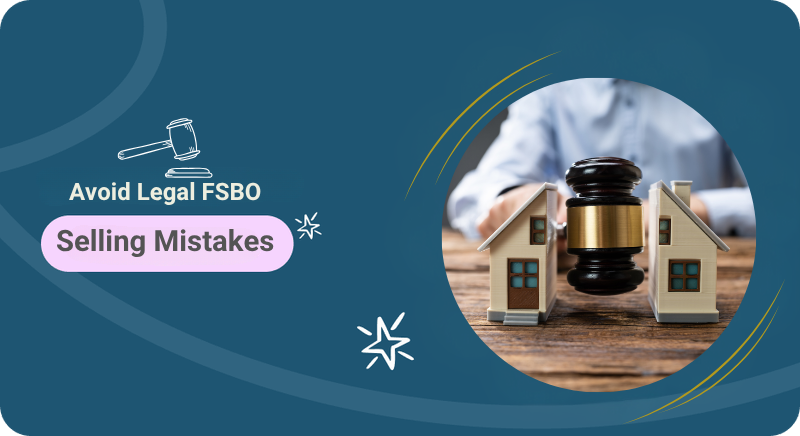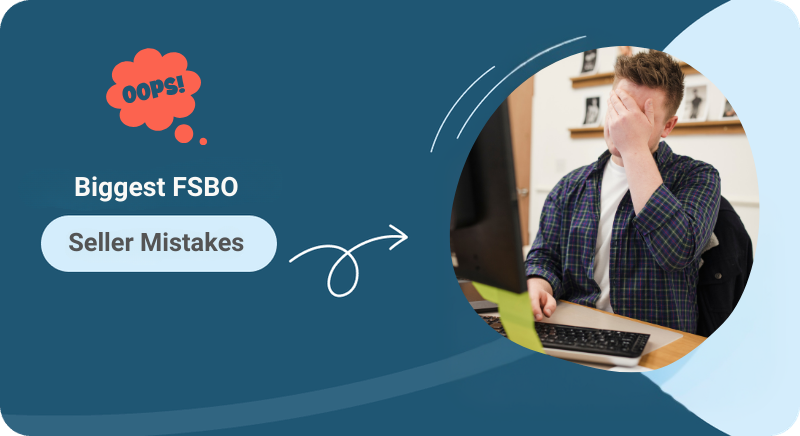Selling your home For Sale By Owner (FSBO) in California can help you save thousands in real estate commission. But when you choose to sell without a Realtor, you take on all the legal responsibilities that come with the transaction. That’s why it’s essential to understand the potential legal risks and how to avoid them.
Here are the top legal pitfalls FSBO sellers in California should watch out for and how to protect yourself while keeping more of your equity.
1. Failing to Provide Required Disclosures
California law requires sellers to disclose known material facts about the property. Failing to do so can lead to lawsuits, delays in escrow, or the cancellation of the sale.
What to disclose:
- Property defects (roof leaks, foundation cracks, plumbing issues)
- Pest infestations or damage
- Death on the property within the last 3 years
- Neighborhood nuisances (noise, crime, etc.)
- HOA rules and fees (if applicable)
Forms you’ll need:
- Transfer Disclosure Statement (TDS)
- Natural Hazard Disclosure (NHD)
- Mello-Roos or Special Tax Disclosure (if applicable)
Tip: You can purchase a full disclosure package or work with a professional disclosure service to stay compliant.
2. Using Outdated or Incorrect Contracts
One of the most common FSBO mistakes is using templates or contracts that aren’t valid in California. Each state has specific laws regarding real estate transactions, so using the wrong paperwork can lead to a failed deal or legal issues after closing.
Make sure your forms:
- Are valid in California
- Include all required contingencies (inspection, financing, etc.)
- Clearly outline the terms of the sale
- Comply with state and federal laws
You can find California-compliant FSBO contracts through:
Or work with a Transaction Coordinator or attorney to make sure your documents are complete and accurate.
3. Not Understanding Escrow Requirements

In California, escrow is a required part of every real estate transaction. The escrow company serves as a neutral third party that holds funds, processes paperwork, and ensures all legal conditions are met before closing.
Legal risks of skipping escrow:
- Disputes over deposits
- Improper title transfers
- Delays in closing
Always work with a licensed escrow and title company to ensure the transaction is handled correctly and legally.
4. Overlooking Local and State Compliance Rules
Selling real estate without an agent does not exempt you from compliance with state or city regulations. Some of the most overlooked rules include:
- Smoke and carbon monoxide detector certification
- Water heater bracing
- Point-of-sale inspections (required in some cities)
- Septic or well inspections (if applicable)
Failure to meet these requirements can delay closing or open you up to liability after the sale.
5. Not Reviewing the Preliminary Title Report
The Preliminary Title Report (prelim) reveals issues that could affect the transfer of ownership, including:
- Liens or unpaid taxes
- Easements or encroachments
- Ownership discrepancies
Tip: Review the title report early and resolve any issues before listing your property. Your title company can guide you through this process.
6. Mismanaging Earnest Money Deposits

In California, earnest money deposits are usually held in escrow. FSBO sellers who handle deposits on their own risk violating escrow regulations or mishandling funds, which can lead to legal disputes.
To protect yourself:
- Never deposit buyer funds into a personal account
- Use a licensed escrow company
- Document all terms of the deposit in the purchase agreement
7. Negotiating Without Legal Guidance
Negotiating the sale price, repairs, or credits without experience can result in unclear or unenforceable agreements. Worse, you might unknowingly agree to terms that are not in your best interest.
To stay protected:
- Put all agreements in writing
- Avoid informal "handshake" deals
- Consult a legal advisor or transaction coordinator when needed
8. Not Keeping a Paper Trail
Everything related to the sale — offers, counteroffers, inspections, disclosures, receipts, communications — should be documented and stored securely.
Why this matters:
- Provides protection in case of disputes
- Verifies what was disclosed
- Confirms deadlines were met
Use digital tools like Google Drive, DocuSign, or Dropbox to keep everything organized.
9. Failing to Follow Federal Laws (Lead-Based Paint, Fair Housing, etc.)
Even when selling on your own, you must follow federal real estate laws. This includes:
- Lead-Based Paint Disclosure for homes built before 1978
- Fair Housing Act compliance — you cannot discriminate based on race, religion, gender, family status, disability, or national origin
Violations can result in serious fines or lawsuits, so make sure you understand your responsibilities.
10. Skipping Professional Support Entirely
While FSBO means you’re not hiring a traditional agent, it doesn’t mean you should do everything alone. Trying to handle legal paperwork, negotiations, and compliance solo can put your sale — and finances — at risk.
Support options include:
- Flat Fee MLS services like ListLean (to get MLS access)
- Transaction Coordinators (to manage paperwork and deadlines)
- Real estate attorneys (for complex situations)
A little help goes a long way when it comes to legal peace of mind.
Sell Smart, Stay Compliant
Selling your home without a Realtor in California is possible — and profitable — but only if you avoid common legal pitfalls. Understanding your responsibilities as a seller helps you protect your investment and close confidently.
At ListLean, we make FSBO easier by giving you access to the MLS, optional transaction support, and tools designed for homeowners who want to take control without cutting corners.
Visit www.listlean.com to learn more about our Flat Fee MLS services and how to sell your home the smart way.







.jpg)

.svg)
.svg)